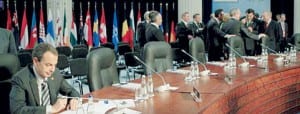IN seven years he has seen his popularity rating drop spectacularly in half.
Once hailed as the new face of Europe’s left, Jose Luis Rodriguez Zapatero’s approval rating has plummeted thanks, in part, to a crushing recession sparked by the burst of the housing bubble.
Having governed Spain through its greatest ever boom, he has now overseen what is possibly its greatest bust, leaving a trail of devastation in his wake.
Spain’s unemployment rate stands at 22 per cent – the highest in the European Union – and the government has been compelled to adopt tough austerity measures in a bid to claw back some of the debt and bring the Spanish economy back from the brink.
And of course, with severe budget trimming comes social disruptions meaning Zapatero’s final term in office has been marked in the main by a crippled economy, protests and the rise of the now-famous Indignant.
The recent regional and local elections proved to be a total disaster for Zapatero’s socialist party, and all the polls predict a landslide victory for the opposition Popular Party (PP) on November 20.
But it is hard to know exactly how history will remember the increasingly unpopular incumbent President.
Although now associated more with his mishandling of the economic crisis, it must be said Zapatero – who announced in April that he would not stand for re-election – achieved a lot in the seven years he was in the Moncloa Palace.
Certainly his legacy in other areas – particularly social reform – is substantial.
A small town lawyer from Valladolid, he rose rapidly through the ranks of the Spanish Socialist Workers Party (PSOE) to become Secretary General and later Prime Minister.
Many believe had it not been for the Madrid bombings coming just three days before the vote, and more crucially the widespread belief that the centre-right government of José María Aznar had lied in its response to the attacks, blaming ETA and not al-Qaida, Zapatero may never have won.
But win he did, going on to be re-elected in 2008.
One of his key problems has been that he simply doesn’t cut the most ministerial of figures. Indeed he has been easily caricatured from the start and when Spain assumed the EU presidency under him for the first time a picture of Mr Bean (Rowan Atkinson) was temporarily posted on the official website.
His power in the international arena has been tempered by his lack of English, which has proved embarrassing time and again – at many international meetings he has been the only head of state with need of a translator – but to his merit he has handled the (extensive) mocking with good grace.
And incidentally Rajoy who looks set to take over the reigns of power cannot speak English either.
This aside, ‘ZP’ – meaning Zapatero Presidente, – has used his time in office to enact progressive, often controversial, social reforms.
In fact, Esteban Gonzalez Pons of the PP conceded in recent months that Zapatero “will be remembered as a prime minister who was concerned about people’s rights.”
The legalisation of same-sex marriage, making abortion more accessible and speeding up divorce, are just some of the most obvious – and controversial – of these rights.
He also made himself friends and enemies by broaching the issue of the Civil War with his Historical Memory law which recognised the victims of both sides of the conflict.
Criticised as ‘needless meddling with history’, the law sought moral redress for victims of the war and the dictatorship and it also decreed the withdrawal of Francoist symbols from public spaces.
Most significant of all however, to many Spaniards, was his hostility to the Iraq invasion and withdrawal of troops from the country on taking office.
This lead to long term diplomatic tension with the George W Bush administration in the US – Bush exchanged only a handful of words with him during five years – but it served as a badge of honour for many voters.
More controversially within Spain he also made attempts at peace negotiations with ETA.
Tragically his declaration, in December 2006, that “in a year’s time things will be better than they are now” was undermined when ETA broke off their ceasefire within hours by killing two people with a bomb in Madrid airport.
Yet now, five years on, just as he makes ready to step down, one of his biggest ambitions has moved a step closer with ETA’s announced decision to cease its terrorist campaign.
Ultimately, however, Zapatero has fallen victim to the times.
In his almost eight years as President, Zapatero has had to battle with economic problems, unseen by his predecessor but in his dealing with it he has been shown wanting.
Hounded for his initially sluggish response to the economic crisis and then his austerity-minded budgets, he has won some of the worst approval numbers of any Spanish head of government.
But if you cast your mind back eight years it wasn’t always this way.
And history will likely be kinder to him than the present day opinion polls.











He was on a good hiding to nothing from the moment the Madrid bombers and the lying PP handed him the election.
The PP created the insane housing bubble – what could he do!
If he stopped this madness what was he going to replace all those construction and supply jobs with.
What he should have done is tackle the corruption mentality that affects 99% of the Spanish people but would his own people support him – very doubtful since PSOE is only marginally behind the PP in this.
He could have destroyed the power of the venal Catholic church and done away with all the saints days that negate any efficiency gains (doubtful) made in Spanish industry.
He could have banned any new golf courses and confiscated all the others in southern Spain and turned them into wildlife centres.
He could have instituted agricultural colleges to educate ganadors who have less plant knowledge than the Incas had 6 centuries ago.
He could have stopped all the HGV passenger lines and started building HGV freight lines instead.
He is in complete denial of the massive desertification that is happening across Spain – forget Rioja wine – desertification is already happening there and remember Rioja is northern Spain.
Desalinated water – is no answer. Europe’s biggest desal. plant will be commisioned soon near Valencia but no one is listening to the farmers who say that they will never be able to afford to buy the product.
These are the issues and more besides that ‘no shoulders’ should have dealt with but then again he is a parasitic lawyer, so we probably should’nt have expected anything different.